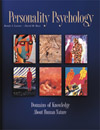
Culture and personality |  |
Learning ObjectivesUpon completing this chapter, you will be able to:
| Identify four reasons that personality psychologists believe it is useful to explore personality across cultures. |
| Identify and discuss the key components of "culture." |
| Define "cultural variations" and present several examples of cultural variations. |
| Define cultural personality psychology and identify the three key goals of this discipline. |
| Discuss theory and research on evoked cooperation, early experience and evoked mating strategies, and honors, insults, and evoked aggression, as examples of evoked culture. |
| Define "transmitted culture." |
| Discuss theory and research on cultural differences in moral values, self-concept, self-enhancement, and personality variations within cultures as examples of transmitted culture. |
| Define "cultural universals" and present a few examples of likely cultural universals. |
| Discuss theory and research on beliefs about the personality characteristics of men and women with reference to cultural universals. |
| Discuss theory and research on the cultural universality of emotions, including a discussion of the difference between the experience and public display of emotions. |
| Discuss theory and research on personality evaluation with reference to cultural universals. |
| Discuss theory and research addressing the cultural universality of the five-factor model of personality. |
|
|